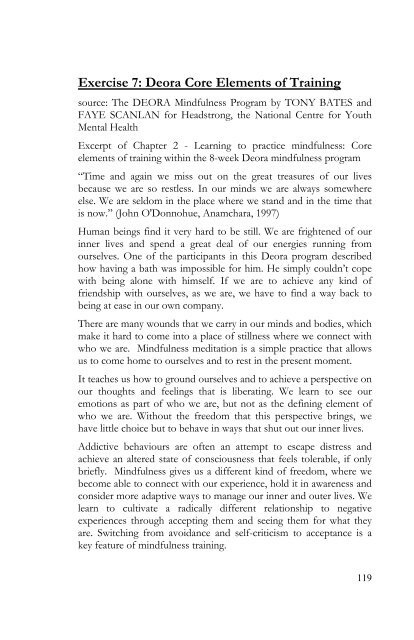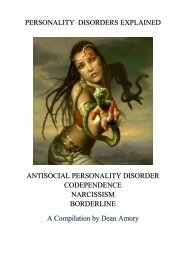Introduction to Mindfulness - Dean Amory
Art and Benefits of Mindfulness Meditation
Art and Benefits of Mindfulness Meditation
Create successful ePaper yourself
Turn your PDF publications into a flip-book with our unique Google optimized e-Paper software.
Exercise 7: Deora Core Elements of Training<br />
source: The DEORA <strong>Mindfulness</strong> Program by TONY BATES and<br />
FAYE SCANLAN for Headstrong, the National Centre for Youth<br />
Mental Health<br />
Excerpt of Chapter 2 - Learning <strong>to</strong> practice mindfulness: Core<br />
elements of training within the 8-week Deora mindfulness program<br />
“Time and again we miss out on the great treasures of our lives<br />
because we are so restless. In our minds we are always somewhere<br />
else. We are seldom in the place where we stand and in the time that<br />
is now.” (John O'Donnohue, Anamchara, 1997)<br />
Human beings find it very hard <strong>to</strong> be still. We are frightened of our<br />
inner lives and spend a great deal of our energies running from<br />
ourselves. One of the participants in this Deora program described<br />
how having a bath was impossible for him. He simply couldn’t cope<br />
with being alone with himself. If we are <strong>to</strong> achieve any kind of<br />
friendship with ourselves, as we are, we have <strong>to</strong> find a way back <strong>to</strong><br />
being at ease in our own company.<br />
There are many wounds that we carry in our minds and bodies, which<br />
make it hard <strong>to</strong> come in<strong>to</strong> a place of stillness where we connect with<br />
who we are. <strong>Mindfulness</strong> meditation is a simple practice that allows<br />
us <strong>to</strong> come home <strong>to</strong> ourselves and <strong>to</strong> rest in the present moment.<br />
It teaches us how <strong>to</strong> ground ourselves and <strong>to</strong> achieve a perspective on<br />
our thoughts and feelings that is liberating. We learn <strong>to</strong> see our<br />
emotions as part of who we are, but not as the defining element of<br />
who we are. Without the freedom that this perspective brings, we<br />
have little choice but <strong>to</strong> behave in ways that shut out our inner lives.<br />
Addictive behaviours are often an attempt <strong>to</strong> escape distress and<br />
achieve an altered state of consciousness that feels <strong>to</strong>lerable, if only<br />
briefly. <strong>Mindfulness</strong> gives us a different kind of freedom, where we<br />
become able <strong>to</strong> connect with our experience, hold it in awareness and<br />
consider more adaptive ways <strong>to</strong> manage our inner and outer lives. We<br />
learn <strong>to</strong> cultivate a radically different relationship <strong>to</strong> negative<br />
experiences through accepting them and seeing them for what they<br />
are. Switching from avoidance and self-criticism <strong>to</strong> acceptance is a<br />
key feature of mindfulness training.<br />
119

















